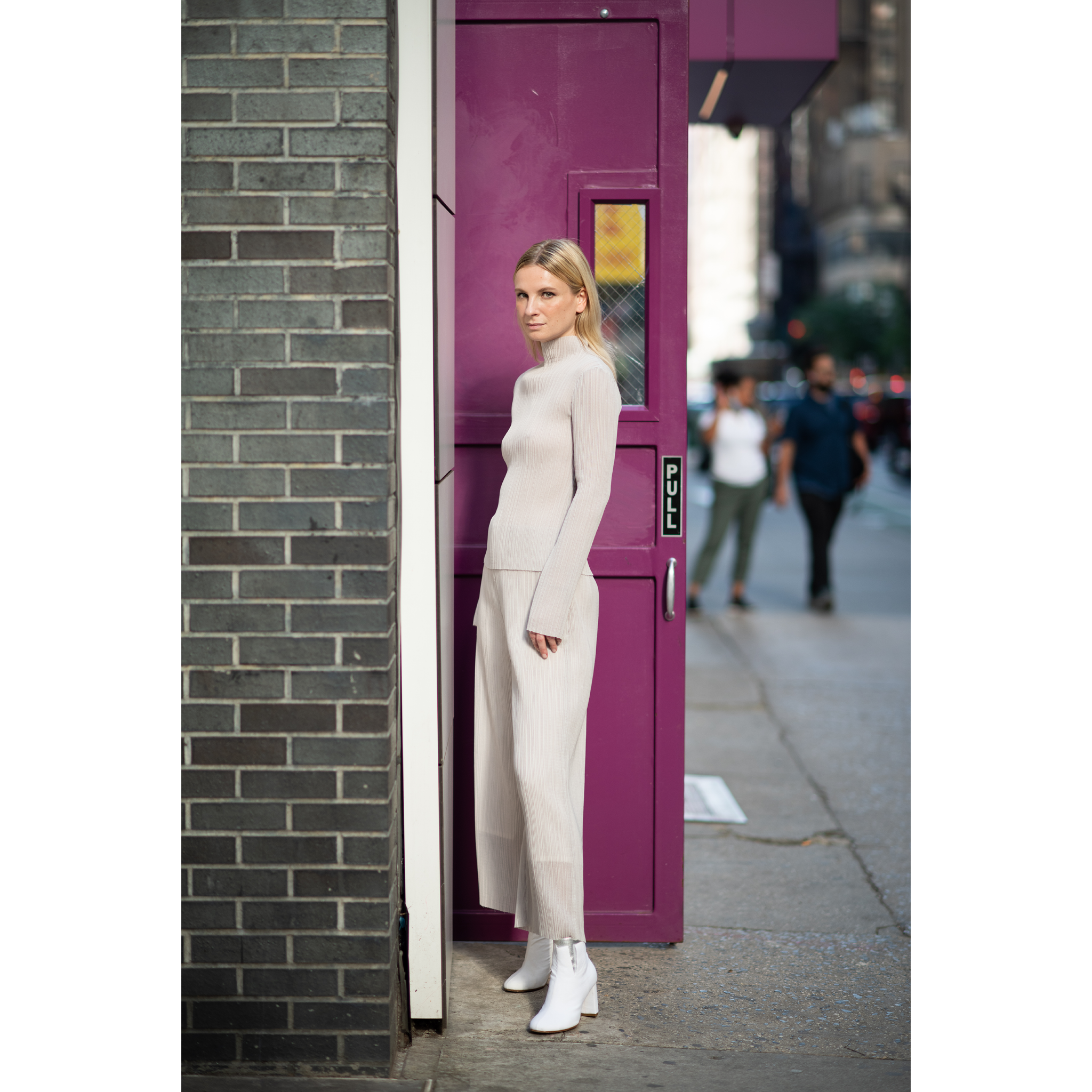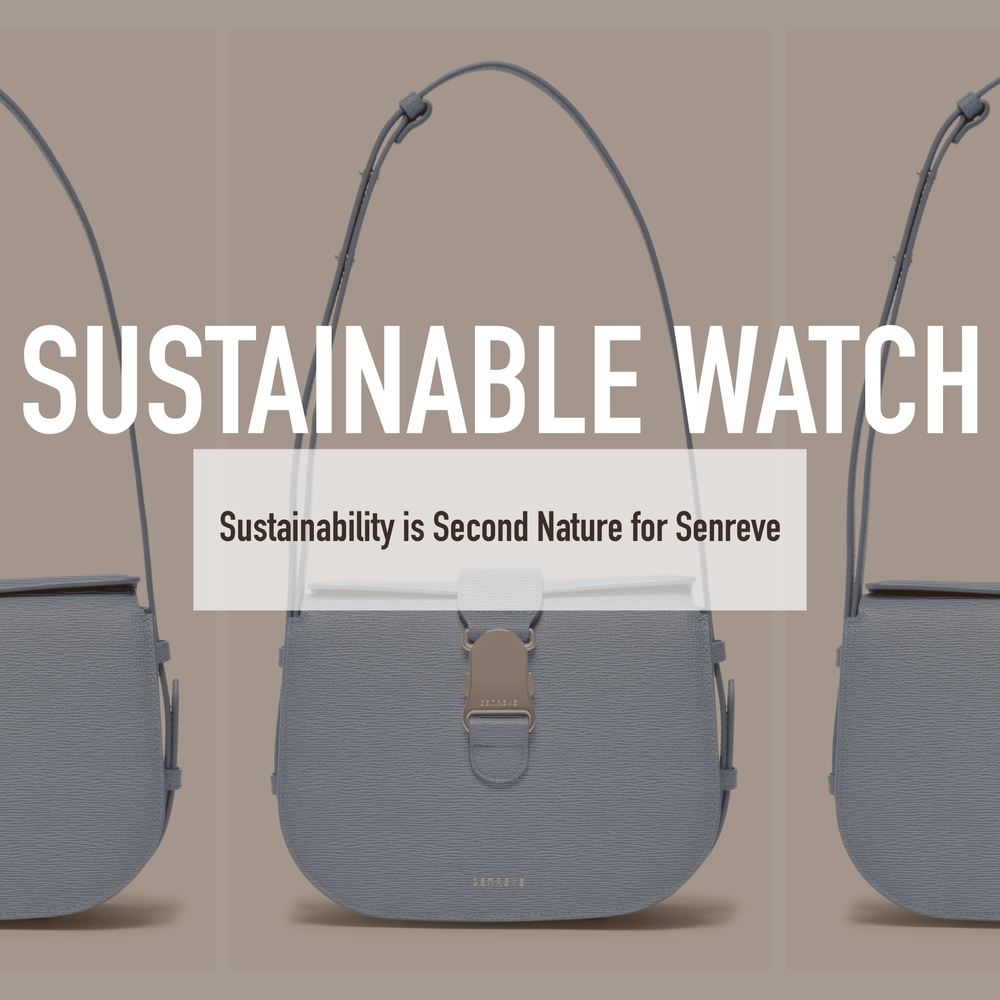In Conversation with Karolina Zmarlak: On NYC Climate Week and Curbing Consumption
New York Fashion Week is a celebration of the art of fashion design and free expression through clothing. The city’s most notable editors, influencers, and creatives flaunt the latest trends and note the impactful silhouettes and shapes for the upcoming season. However, what is not always spotlighted during this week of glitz and excessive glamour are the frameworks behind this picturesque narrative, which, as we know, are not always as charming as they seem.
The notion that drives the contemporary fashion industry as we know it is hyper consumerism. Although this is not always explicitly examined during the week, sustainable fashion advocates and those looking to shift this narrative bring these issues to light during Climate Week NYC, which directly follows NYFW. From September 19-25th, many local, responsible brands hold a magnifying glass to the dark underbelly of the fashion industry and provide visibility to what actually lies behind the perfectly polished runways. Driving climate action, many creators came together during this educational week to show that there is a way to partake in this industry with intention and without further harming our environment.
Founder of KZ_K Studio, a New York-based, ethical, and convertible womenswear label, Karolina Zmalark met with PhotoBook to discuss the positive benefits of instilling Fashion Month programming with environmental education, her brand’s advances in decreasing frivolous consumption, and what slow fashion means to her.
How did KZ_K Studio begin and what were your original core values and intentions?
I was on the train home with my partner, Jesse Keyes, when we conceived of a fashion line that would cater to the tenets of multi-functionalism, a foundational notion within the discipline of architecture. We wanted to make pieces that could be worn, in many variations or together, in a series of alternative ways to fit the unique functional and aesthetic needs of modern women. This new concept would allow our clients personalization but would also be oriented toward creating value, whether you buy one piece and wear it in different ways.
When did you begin to notice that overconsumption is a large problem in the fashion industry?
Overconsumption has been a problem that has continued to accelerate for the past few decades. The number of garments produced each year has at least doubled since 2000, Coupled with the fact that the average piece of clothing will only be worn about seven times before getting tossed. Fast fashion giants play a huge role in overconsumption, despite trying to make “progress” toward more sustainable practices. Slow fashion is really one of the only true ways to counteract the problem.
What does “slow fashion” mean to you?
Slow fashion means being mindful of the processes and resources required to make clothing while reducing consumption. We approach this by designing for longevity and timelessness, minimizing intermediaries, producing locally in New York following a sustainable approach to production, and sourcing fabrics from countries that employ environmentally-responsible fabric manufacturing processes in Europe and Japan.
How do you incorporate longevity into all of your designs and why do you think longevity when it comes to design ideation is important?
It’s important to slow the cycle of consumption and design pieces for a lifetime of use. At KZ_K Studio, we design each and every piece around our four design disciplines: (1) multi-form/multifunctionality, (2) technical development for reversibility and convertibility, (3) using advanced fabrics, and (4) adhering to our minimalistic and modern aesthetic. By consistently following these principles we’re ensuring that each piece can be worn in a multitude of ways, that the fabric quality and construction of each garment will stand the test of time, and that pieces will become foundations of your wardrobe.
Was it difficult to establish a production process that is all based in New York City? Even if you faced obstacles, why did you decide that prioritizing local production was essential?
While it may cost ten times more to cut, sew, and sample a garment with our partners here in New York City, local production is paramount to our responsible fashion mentality. It allows us to be in-person, communicating with our factory partners, all of whom are highly skilled and paid fair wages. It also affords us the ability quickly to make corrections and increase production as needed. Is it difficult? Super difficult. But a core tenet of our “slow fashion” value is to do the demanding work to develop deeper relationships, so that longer, more committed, and trust-oriented production relationships may persist. In fact, the low-cost transactional nature of foreign production and import may be easier on paper, and in volume, but they don’t yield thoughtful results. That said, there is nothing more invigorating than knowing that one can find absolutely everything in New York City’s Garment District, in person: fabric, binding, fusing, trim, patterns. It is a one-stop shop and a one-stop community.
Can you provide an example of a new sustainable fabric or eco-friendly dyeing technique you have implemented recently that you think other brands can learn from?
Each season we look to do better. For our Warm Cycle collection, our mill worked with a Japanese-based company that reutilizes food waste products. The FOOD TEXTILE Project extracts ingredients from vegetable waste and uses these ingredients to make dye and to provide yarn, fabrics, and products colored using these dyes. Partnering with companies that can teach us and allow us to make meaningful and conscious choices to continue building a smaller footprint is always a personal and professional goal for me and the studio. Our La Plage organic cotton pullover used this plant dying process.
How does it make you feel, as a champion of slow fashion and lessening consumption, that New York City is now embracing more ethical habits by hosting Climate Week?
Every possible intentional and serious effort to discuss, determine solutions, and act on them in the service of reducing humankind’s tremendously destructive behavior on Mother Earth is welcome in my book. I only wish that the large industrial powers would translate their “ESG goals” into solutions that stop the destruction in its tracks. Greta Thunberg is a great inspiration because she has shown that human action is not moving fast enough. We need ALL Hands-on deck to reverse this ship.
What do you hope others learn or gain from buying into your brand or other sustainable brands, such as those involved in Climate Week?
The most important message is to buy less, buy quality, and buy within a consistent personal aesthetic that you have developed to match your own stylistic vision and objectives.
Website: https://www.kzkstudionyc.com
Instagram: @karolinazmarlak
Article by Kayla Curtis-Evans, Contributing Sustainable Editor PhotoBook Magazine
Tearsheets by Alexa Dyer, Graphic Design Coordinator, PhotoBook Magazine
*All images are courtesy of KZ_K Studio









